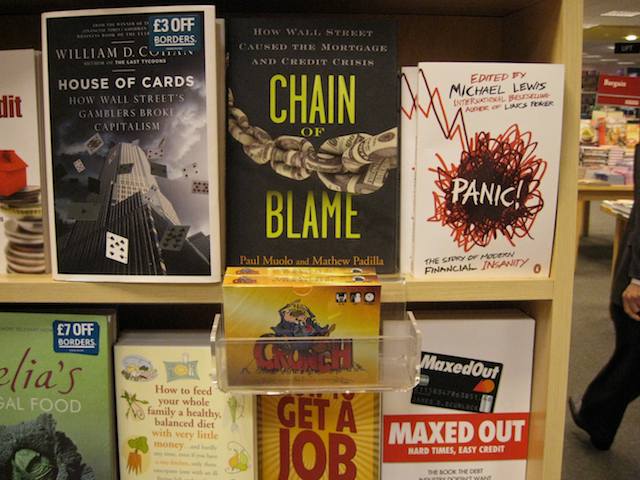Flickr version here.
The petrolhead’s dream
Flickr version here.
It’s an ill wind…
The ultimate notebook
Noteboek from Evelien Lohbeck on Vimeo.
This is the cleverest video I’ve seen in ages. User-generated content at its very best. Thanks to Robert Scoble for spotting it.
Health warning: Ballsheimer’s disease reaching epidemic proportions
Jon Stewart has uncovered evidence of a new disease that is sweeping through the ranks of senior members of the Bush administration. It’s called Ballsheimer’s Disease. The symptoms are acute memory loss concerning unpalatable facts, and superhuman levels of effrontery. A prominent victim is former Vice-President Dick Cheney who last week was observed campaigning for freedom of information and the publication of classified documents. There is currently no known cure for the condition, though neuroscientists claim that some patients have been helped by lobotomy.
Former President George W. Bush is reported to be setting up a FaceBook group to campaign for better treatment for Ballsheimer’s sufferers. Interviewed at his ranch in Crawford, Texas, Mr Bush said that he would be setting up the group just as soon as he had located his Profile.
The iPhone and telephone-number profits
This morning’s Observer column.
The significance of the iPhone – as regular readers know – lies in its operating system. It's really a powerful Unix computer that fits into the palm of your hand. That means it can run very sophisticated software – such as a browser that actually makes it feasible to read web pages and even books on a small screen. Add to this the fact that it is also permanently connected to the internet and you have what the rest of the industry is starting to recognise as a game changer.
Actually, the PC business is also beginning to wake up to the threat of the iPhone. How come? Well it turns out that iPhone users make less use of their laptops and desktop computers. The reason is obvious when you think about it: much of what we do on the net is pretty routine – checking email, accessing websites, Googling, accessing Facebook or Twitter. If you can do all that without booting up a computer, why bother?
The iPhone is also transforming the market for software…
Anti-social networking
Well, well. Why am I not surprised by this?
A police officer has been given a written warning after he posted on his Facebook page that he was going to “bash” demonstrators at the G20 protests.
PC Rob Ward’s message was apparently published on the social networking website shortly after the death of newspaper seller Ian Tomlinson. His status, timed at 8.17pm on April 1, read: “Can’t wait to bash some long haired hippys (sic) up @ the G20.” Twenty minutes later a reply was posted saying: “LMAO (laughing my a*** off) dats bad but good in da same way lol (laugh out loud).”
The policeman’s page has now been taken off Facebook.
A Scotland Yard spokeswoman said: “A PC from Enfield was today given a written warning under public conduct regulations.” She confirmed the officer would face no further disciplinary action.
Coincidentally, I saw this news report shortly after reading this blog post by someone I follow on Twitter:
I know two policemen well. They are both good guys and in my age group, I’m 48. One’s a traffic copper and the other works in the drug squad. Both hate their jobs. They have two complaints. The first is the familiar one of red tape and stupid laws obstructing their ability to do their work properly. The other, I feel, is directly related to the type of stories that are making it into the news this week.
The force, they tell me, has been infiltrated by people who are not really interested in our society and its well being. Instead, they like the pay and conditions, not to mention the generous pension arrangements. More disturbingly, they like power and actually seem to enjoy violence. They show little regard or respect for any member of society regardless of race or social class. They have a deep set ‘us and them’ attitude that is, in my opinion, both wrong and probably rather dangerous.
Take a look at the films of the police problems at the protests. Now mentally remove the uniforms (for those that were actually wearing any) and dress the guys in a football shirts or even hoodies. Get the picture?
And, while we’re on the subject, here’s an interesting YouTube video which illustrates current police attitudes towards being photographed or filmed:
America’s newest profession?
Hmmm… There’s an interesting article in the WSJ which makes some intriguing but implausible claims:
In America today, there are almost as many people making their living as bloggers as there are lawyers. Already more Americans are making their primary income from posting their opinions than Americans working as computer programmers or firefighters.
Paid bloggers fit just about every definition of a microtrend: Their ranks have grown dramatically over the years, blogging is an important social and cultural movement that people care passionately about, and the number of people doing it for at least some income is approaching 1% of American adults.
The best studies we can find say we are a nation of over 20 million bloggers, with 1.7 million profiting from the work, and 452,000 of those using blogging as their primary source of income. That’s almost 2 million Americans getting paid by the word, the post, or the click — whether on their site or someone else’s. And that’s nearly half a million of whom it can be said, as Bob Dylan did of Hurricane Carter: “It’s my work he’d say, I do it for pay.”
I’m afraid I don’t believe the numbers in the article. The main problem, I think, is the inferences made about the number of bloggers who actually earn a living from their work. I’m sure that lots of them earn pin-money or better from Google AdSense etc. But if ‘earning a living’ means pulling in, say, $50k or more a year, then I haven’t seen many of them in my corner of the blogosphere. See here for another sceptical response which criticises, among other things, the WSJ’s credulity about Technorati surveys.
The WSJ (to its credit) later appended a note at the end of the piece, saying in part:
People have raised questions about the calculations on the numbers of bloggers for hire. First, I was surprised at how few studies there are on this and I believe there definitely should be more. So perhaps in the future I will do some original research, but for this piece we took the best we could find and referenced every number so people would know where they came from.
There is no question that the blogosphere, fast-growing as it is, has yet to nail down one way to measure itself or gauge its activity. But the most comprehensive sources we could find, conducted by reputable professionals, say there are over 22 million bloggers out there; and that 2% of bloggers are making their living blogging. Do the math, and you get roughly 450,000. It’s a fast-growing group and we ignore their needs, and influence, at our peril.
As far as the $75,000, the Technorati report says that of those bloggers who had 100,000 or more unique visitors, the average income is $75,000. True, it’s not the median, but it is the average. We can quibble about how easy it is to make this kind of money — but the point is, the huge potential is there.
On this day…
… in 1945, the US and Soviet armies linked up on the river Elbe River, a meeting that marked the end for Hitler’s Germany — and sealed the fate of Europe for several generations.
Fools’ Gold
Howard Davies reviews Gillian Tett’s book on the banking catastrophe in today’s Financial Times. Excerpt:
The thesis of Fool’s Gold is that a small group of clever quants at JPMorgan invented credit derivatives, all those dangerous acronymic creatures – CDOs, CLOs and the like – that we have come to know as the crisis has evolved. But it was other, greater fools, in other banks, who misunderstood and misused them.
[…]
She introduces us to the individuals who made it all happen: Bill Winters, Peter Hancock and Bill Demchak in the US, Blythe Masters and Tim Frost in London. Winters and Masters are still with the bank; the others have moved on. Masters is still the high priestess of securitisation as chair of New York’s Securities Industry and Financial Markets Association, though when she speaks in public these days, notes Tett, “in deference to the dark mood of the times, she wears a sombre, chocolate-brown suit, instead of her usual jewel-toned hues”. Such subtle semiotics are not available to men – it’s not fair. Frost emerges as a kind of Macavity the mystery cat: now a firework inventor, now a trader, then creatively salvaging a structured investment vehicle (SIV), and today an advisor on restructuring to the Bank of England.
The innovations that emerged from the fertile minds of this talented team were supposed to make the world safer. They allowed risks to be sliced and diced and spread around the globe, held by those best able to bear them. This narrative, assiduously promoted by the banks, was generally accepted by the financial authorities at the time. In its 2006 annual report, the International Monetary Fund (IMF) noted that: “The dispersion of credit risk by banks to a broader and more diverse set of investors … has helped to make the banking and overall financial system more resilient … improved resilience may be seen in fewer bank failures.”
But in the wrong hands these fireworks proved to be, well, explosive…
Yep.





